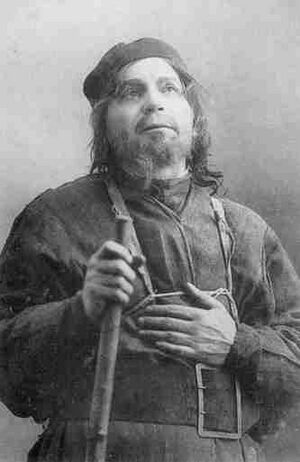Matvey Luzin and Aleksandr Uspensky: Difference between pages
Tchaikovsky Research
(Difference between pages)
No edit summary |
No edit summary |
||
| Line 1: | Line 1: | ||
{{picture|file= | {{picture|file=Aleksandr Uspensky.jpg|caption='''Aleksandr Uspensky''' (1859-1920)}} | ||
Russian | Russian opera artist (tenor) and teacher (b. 9/21 October 1859 in Tambov; d. 1920 in [[Moscow]]), born '''''Aleksandr Mikhaylovich Uspensky''''' (Александр Михайлович Успенский). | ||
The son of a priest, Uspensky studied vocal technique at the [[Moscow]] Conservatory from 1879, and was later schooled abroad. From 1890 to 1920 he made regular appearances on the stage of the Bolshoi Theatre in [[Moscow]], and was an active member of the Society of Russian Amateur Musicians. He also taught at the [[Moscow]] Conservatory (1885–1891) and the [[Moscow]] School of Music and Drama, where he was appointed professor in 1904. | |||
==Correspondence with Tchaikovsky== | ==Correspondence with Tchaikovsky== | ||
One letter from Tchaikovsky to | One letter from Tchaikovsky to Aleksandr Uspensky has survived, dating from 1887, and has been translated into English on this website: | ||
* [[Letter | * '''[[Letter 3350]]''' – 13/25 September 1887, from [[Moscow]]. | ||
==External Links== | ==External Links== | ||
* [[wikipedia:ru: | * [[wikipedia:ru:Успенский,_Александр_Михайлович|Wikipedia]] (Russian) | ||
[[Category:People| | [[Category:People|Uspensky, Aleksandr]] | ||
[[Category:Correspondents| | [[Category:Correspondents|Uspensky, Aleksandr]] | ||
[[Category:Singers|Uspensky, Aleksandr]] | |||
Latest revision as of 11:47, 24 August 2023
Russian opera artist (tenor) and teacher (b. 9/21 October 1859 in Tambov; d. 1920 in Moscow), born Aleksandr Mikhaylovich Uspensky (Александр Михайлович Успенский).
The son of a priest, Uspensky studied vocal technique at the Moscow Conservatory from 1879, and was later schooled abroad. From 1890 to 1920 he made regular appearances on the stage of the Bolshoi Theatre in Moscow, and was an active member of the Society of Russian Amateur Musicians. He also taught at the Moscow Conservatory (1885–1891) and the Moscow School of Music and Drama, where he was appointed professor in 1904.
Correspondence with Tchaikovsky
One letter from Tchaikovsky to Aleksandr Uspensky has survived, dating from 1887, and has been translated into English on this website:
- Letter 3350 – 13/25 September 1887, from Moscow.
External Links
- Wikipedia (Russian)

